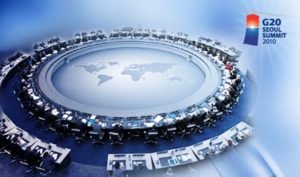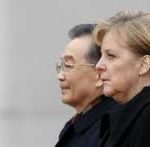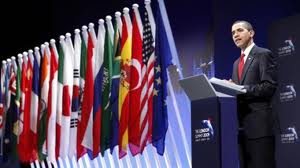 The G-20 is the forum of the future, and will be one of the most influential international bodies of the future. So argued my colleague, Roger Scher, on the Rising Powers blog in March of 2009. In a rare instance, I happen to agree with him. When the present international system finds itself in transformation, as it is now – precipitated by the global financial crisis – it results in a significant decline in the relative power and influence of Western nations, while the newer emerging nations acquire for themselves important positions in global finance and world affairs, with much of that newfound authority being relinquished by those Western powers that are in relative decline (Read more on that, here). That stark reality provides a relevant framework for what to look for at the 2010 Seoul, South Korea G-20 Summit. Expect to see more visible, more vocal and more influential voices from nations such China, Brazil, Germany and India, among others.
The G-20 is the forum of the future, and will be one of the most influential international bodies of the future. So argued my colleague, Roger Scher, on the Rising Powers blog in March of 2009. In a rare instance, I happen to agree with him. When the present international system finds itself in transformation, as it is now – precipitated by the global financial crisis – it results in a significant decline in the relative power and influence of Western nations, while the newer emerging nations acquire for themselves important positions in global finance and world affairs, with much of that newfound authority being relinquished by those Western powers that are in relative decline (Read more on that, here). That stark reality provides a relevant framework for what to look for at the 2010 Seoul, South Korea G-20 Summit. Expect to see more visible, more vocal and more influential voices from nations such China, Brazil, Germany and India, among others.
The agenda for the 2010 G-20 Seoul Summit, which begins Wednesday night in Seoul, South Korea, is shaping up as a showdown between exporting powers, such as Germany and China, and nations such as the US, France and Britain that are struggling to emerge from recession and high unemployment. Among the issues on the agenda are: controls for the global trade ‘imbalance;’ the global currency war; a coordinated framework for sustainable, balanced global growth; and strengthening the international financial regulatory system, among other items. Ahead of the meeting, tensions have flared in particular between German and US central bank officials. US Treasury Secretary, Tim Geithner, has been pressing member nations to sign up for a new framework that would set limits on countries’ trade balances. Germany, which relies heavily on exports, has lectured Washington about its economic policies, which Berlin sees as profligate and damaging to other nations that have managed their economies more effectively than Washington. China and Germany have formed a tandem alliance, as Reuters is reporting, in heavily criticizing of US Federal Reserve monetary policy. Read more from Reuters here.
 Germany’s criticism echoes that from other countries, including Brazil and Japan, which have complained about potential spillover from the Fed’s actions. German Chancellor Angela Merkel said she hoped to avoid a confrontation between China and the United States in Seoul, and warned against protectionism. But she dismissed US calls for numerical limits for current account balances. Printing more dollars, or cutting US interest rates, tends to weaken the dollar and makes US exports more attractive. The accompanying rise in the value of other countries’ currencies tends to damp their exports and can fuel inflation or asset bubbles, as emerging markets officials note. US officials maintain the Fed’s action is about stimulating domestic demand, and that a weaker dollar is a consequence of that policy, not its objective. Point taken.
Germany’s criticism echoes that from other countries, including Brazil and Japan, which have complained about potential spillover from the Fed’s actions. German Chancellor Angela Merkel said she hoped to avoid a confrontation between China and the United States in Seoul, and warned against protectionism. But she dismissed US calls for numerical limits for current account balances. Printing more dollars, or cutting US interest rates, tends to weaken the dollar and makes US exports more attractive. The accompanying rise in the value of other countries’ currencies tends to damp their exports and can fuel inflation or asset bubbles, as emerging markets officials note. US officials maintain the Fed’s action is about stimulating domestic demand, and that a weaker dollar is a consequence of that policy, not its objective. Point taken.
China has moved adroitly to deflect criticism of its currency policies by pledging to move at a pace in its own economic interests, not that of the West’s; and by pointing to other sources of global imbalances – such as volatile, risky and highly leveraged Western financial markets, and poor fiscal management by US and European central banks.
 However, the proverbial ‘shot across the bow’ for the G-20 Summit in South Korea this week was echoed by President Obama as world leaders began to arrive in Seoul on Tuesday, saying that leaders will have to address global persistent imbalances in global economic growth. Without mentioning it by name, President Obama singled out China’s currency policy, saying: “You are seeing some countries run up very big surpluses and intervening significantly in the currency markets to maintain their advantage when it comes to their currency.” Those comments added to a war of words between Beijing and Washington over how to deal with the fragile global economic recovery. On the other hand, China has moved adroitly to deflect criticism of its currency policies by pledging to move at a pace in its own economic interests, not that of the West’s; and by pointing to other sources of global imbalances – such as volatile, risky and highly leveraged Western financial markets, and poor fiscal management by US and European central banks. China also points out, with some prescience, that the Federal Reserve’s policy of quantitative easing amounts to hypocrisy as the US policy achieves the same ends for which the US criticizes China.
However, the proverbial ‘shot across the bow’ for the G-20 Summit in South Korea this week was echoed by President Obama as world leaders began to arrive in Seoul on Tuesday, saying that leaders will have to address global persistent imbalances in global economic growth. Without mentioning it by name, President Obama singled out China’s currency policy, saying: “You are seeing some countries run up very big surpluses and intervening significantly in the currency markets to maintain their advantage when it comes to their currency.” Those comments added to a war of words between Beijing and Washington over how to deal with the fragile global economic recovery. On the other hand, China has moved adroitly to deflect criticism of its currency policies by pledging to move at a pace in its own economic interests, not that of the West’s; and by pointing to other sources of global imbalances – such as volatile, risky and highly leveraged Western financial markets, and poor fiscal management by US and European central banks. China also points out, with some prescience, that the Federal Reserve’s policy of quantitative easing amounts to hypocrisy as the US policy achieves the same ends for which the US criticizes China.
To be sure, this ensuing conflict over quantitative easing, and global currency valuations will be the pivotal issue of the Seoul G-20 Summit; and is central to the growing trend of a shift in global economic influence — something I’ve written about before. World leaders broadly agree that for the global economy to be more stable, imbalances between creditor countries like China, Brazil and Germany; and that of debtor nations like the US and Britain have to be fixed: but the real question is, how..?? And, ‘at whose expense’..?? Nevertheless, the counter to the fix the “global imbalance” argument is that the global economic crisis, the ‘imbalance’ itself, was precipitated by Western industrial economies – who heretofore, wrote, controlled, and dictated the rules of global economic participation to their benefit and to the detriment of emerging economies – and it is patently immoral to, now, coerce emerging economies to stifle their growth and prudent economic stewardship in order to benefit and reward the wayward economic policies of the Western powers and its financial benefactors (eg, Wall Street). Others, such as IMF President Dominique Strauss-Kahn argue that the answer lies in a coordinated global response where emerging economies have a greater stake in decision-making. Further, many emerging economies contend, that the ‘beggar thy neighbor’ approach by the US and its Western allies is no substitute for making tough, prudent, fiscal and economic decisions at home until the underlying fundamentals lead to economic growth. To that last point, I say, Amen!
Russia will insist at the G-20 summit that the Federal Reserve consult other nations ahead of major monetary policy decisions given the Greenback’s role as the world’s currency standard, or else the US should relinquish that role.
Already, expectations are low for the meeting. The G-20 is struggling to agree on specific targets for Mr. Geithner’s trade regime. It’s also likely to leave unresolved other big questions, such as how to unwind failing international financial institutions, a task made urgent by the recent financial crisis. Mr. Geithner said he is “very confident” world leaders, including those from China, will agree on a new framework that could instead include warning indicators for when a country’s trade balance is out of line.
However, on Monday, China’s Vice Finance Minister Zhu Guangyao said the U.S. isn’t living up to its responsibility as an issuer of a global reserve currency. The Fed’s move doesn’t “take into account the effect of this excessive liquidity on emerging-market economies,” he said. China has in the past publicly suggested that the US dollar should be replaced as the world’s currency reserve of choice.
Meanwhile, the top economic aide to Russian President Dmitry Medvedev said Russia will insist at the G-20 summit that the Fed consult with other countries ahead of major monetary policy decisions given the US dollar’s role as the world’s currency standard, or else the US should consider relinquishing that role. Touche’!
Luxembourg Prime Minister Jean-Claude Juncker, who is Chairman of the Euro-zone finance ministers, also weighed in on the Fed move, saying: “I don’t think it’s a good decision. You’re fighting debt with more debt.” Read more here.
On the other side of the coin, bracing for vigorous protests by South Korea’s highly organized labor unions, there are widespread reports that South Korea’s Ministry have been aggressively barring foreign activists from entering the country. See the video clip below; and read more here, and here.
Sources: Reuters, Daily Telegraph of London, India Times, NPR, WSJ